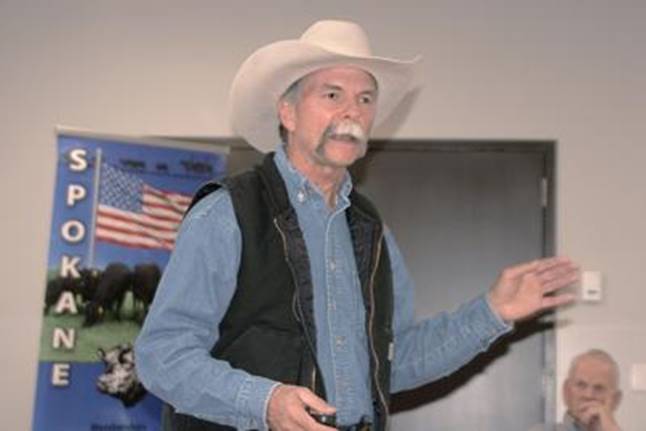National Farmers Union joins R-CALF antitrust complaint
National Farmers Union joins R-CALF antitrust complaint
By MATTHEW WEAVER Capital Press
R-CALF CEO Bill Bullard provides an update on the organization’s antitrust complaint against national packers Oct. 19 during the Cattle Producers of Washington annual meeting in Airway Heights, Wash.
AIRWAY HEIGHTS, Wash. — The National Farmers Union wants to join R-CALF USA in a lawsuit alleging that top meat packers conspired to limit ranchers’ ability to succeed in a marketplace with high demand for their beef.
R-CALF CEO Bill Bullard provided an update on the organization’s antitrust lawsuit during the Cattle Producers of Washington annual meeting Oct. 19 in Airway Heights, Wash.
R-CALF first filed the complaint in April and filed an amended complaint in U.S. District Court in Minnesota Oct. 4.
The complaint alleges that since at least Jan. 1, 2015, Tyson, Cargill, JBS and National Beef "have conspired to fix and suppress – and did, in fact, fix and suppress the price of fed cattle in the United States."
The companies have not responded to requests by Capital Press for comment.
The National Farmers Union has filed a motion to join the lawsuit. A hearing will likely take place in early 2020, said Rob Larew, senior vice president for policy for the organization.
"When you have prices which really do not relate to basic economics, it’s pretty clear that a monopolistic and concentrated power is having negative impact on the market," Larew said.
R-CALF says that the industry must begin to "aggressively" enforce antitrust laws before there is no meaningful competition to preserve.
The packers’ profitability is driven by the "meat margin," or the spread between the price packers pay for fed cattle and the price they charge for beef, according to the complaint.
"Despite the drastic collapse in fed cattle prices caused by Packing Defendants’ conspiracy, Packing Defendants and their wholesale customers continued to benefit from record retail beef prices," the complaint states. "This disconnect allowed Packing Defendants to reap record per-head meat margins during the Class Period at the expense of fed cattle producers …"
R-CALF alleges in the complaint that a confidential witness has confirmed each of the packers agreed to periodically reduce their purchase and slaughter volumes to reduce the price they would otherwise pay for fed cattle.
The packers reduced their purchases of cash cattle during these periods of slaughter restraint to create a glut of slaughter-ready cash cattle and encourage ranchers to accept lower prices for their product, according to the complaint.
"Doing so not only dropped cash cattle prices, but also the prices paid under Packing Defendants’ formula and forward contracts," R-CALF states.
The packers also often conducted most of or all of their weekly cash cattle purchasing during a short 30- to 60-minute window late on Friday, and would adhere to the price established by the Packing Defendant that had opened the weekly cash cattle trade, according to the complaint.
R-CALF filed the complaint on behalf of all cattle producers who sold a fed animal to the packers since January 2015, and anyone who engaged in the cattle futures market on the Chicago Mercantile Exchange (CME) during the same time period, Bullard said.
The packers have 60 days to respond to the amended complaint, Bullard said.
The union has a history of representing farmers in antitrust cases or other situations where farmers don’t have to leverage in monopolies or near-monopolies, Larew said.
"We would not be attempting to join this case if we did not strongly believe the facts will very much speak for themselves and the court will rule in our favor," Larew said.
